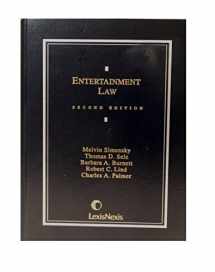
Entertainment Law (Contemporary Casebook Series)
ISBN-13:
9780820530048
ISBN-10:
0820530042
Edition:
2
Author:
Melvin Simensky, Robert C. Lind, Barbara Burnett, Charles A. Palmer, Thomas D. Selz
Publication date:
1709
Publisher:
Lexis Nexis Matthew Bender
Format:
Hardcover
15 pages
Category:
Entertainment
,
Intellectual Property
FREE US shipping
Book details
ISBN-13:
9780820530048
ISBN-10:
0820530042
Edition:
2
Author:
Melvin Simensky, Robert C. Lind, Barbara Burnett, Charles A. Palmer, Thomas D. Selz
Publication date:
1709
Publisher:
Lexis Nexis Matthew Bender
Format:
Hardcover
15 pages
Category:
Entertainment
,
Intellectual Property
Summary
Entertainment Law (Contemporary Casebook Series) (ISBN-13: 9780820530048 and ISBN-10: 0820530042), written by authors
Melvin Simensky, Robert C. Lind, Barbara Burnett, Charles A. Palmer, Thomas D. Selz, was published by Lexis Nexis Matthew Bender in 1709.
With an overall rating of 3.9 stars, it's a notable title among other
Entertainment
(Intellectual Property) books. You can easily purchase or rent Entertainment Law (Contemporary Casebook Series) (Hardcover) from BooksRun,
along with many other new and used
Entertainment
books
and textbooks.
And, if you're looking to sell your copy, our current buyback offer is $0.3.
Description
Emphasizing the business side of the industry, especially the economic risks, this casebook makes use of articles, cases, questions, exercises, statutes and industry contracts. It provides a highly practical learning experience for students interested in this dynamic area of the law. Unlike other casebooks that focus primarily on the law affecting the entertainment industry, this volume presents this subject as a combination of legal principles and business practices. Although the book includes important cases, the authors believe that caselaw is not the best approach to studying entertainment law since most disputes in this area are negotiated or arbitrated, rather than litigated. Thus, rather than relying solely on caselaw, the book provides numerous excerpts from trade publications, such as "Variety", to teach the practical aspects of entertainment law. Compared to caselaw, such material is more interesting to read, more current and more directly relevant to the practice of entertainment law. The book contains numerous hypotheticals throughout, which are closely integrated with the materials and offer students numerous drafting and role-playing opportunities. A set of hypotheticals runs throughout the book covering a fictional client pursuing deals in all branches of the entertainment industry - music, film, television, theatre, book publishing and the Internet. Various assignments require the student to draft agreements, letters or memoranda dealing with the issues raised in the chapters. In addition, there is a series of transactional and litigation hypotheticals that include negotiation exercises. These hypotheticals can be addressed later in the semester to allow students to apply the various concepts learned throughout the course. The book also contains selected portions of current collective bargaining agreements including the Screen Actors Guild Basic Agreement, the Writers Guild Basic Agreement, and the Directors Guild Basic Agreement, as well as entertainment contracts used in the various branches of the entertainment industry and relevant federal and state statutes. The abundance of material in the document supplement provides a wide selection of contracts from which to choose for class discussion, and allows professors to devise numerous hypotheticals in addition to the ones provided in the casebook.


We would LOVE it if you could help us and other readers by reviewing the book
Book review

Congratulations! We have received your book review.
{user}
{createdAt}
by {truncated_author}


